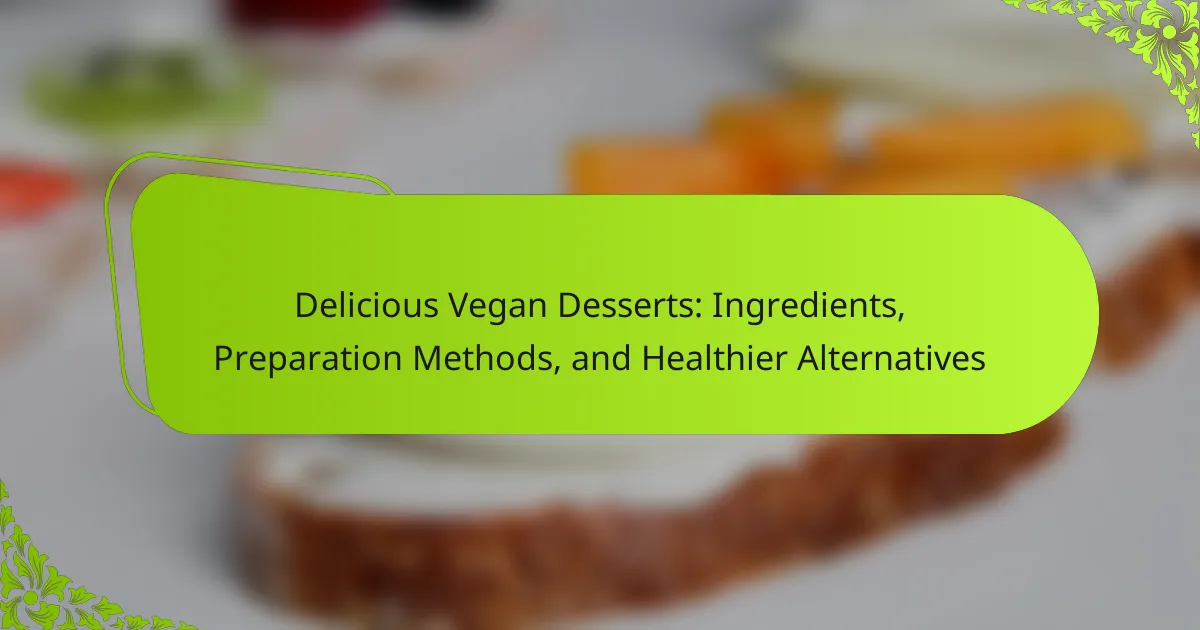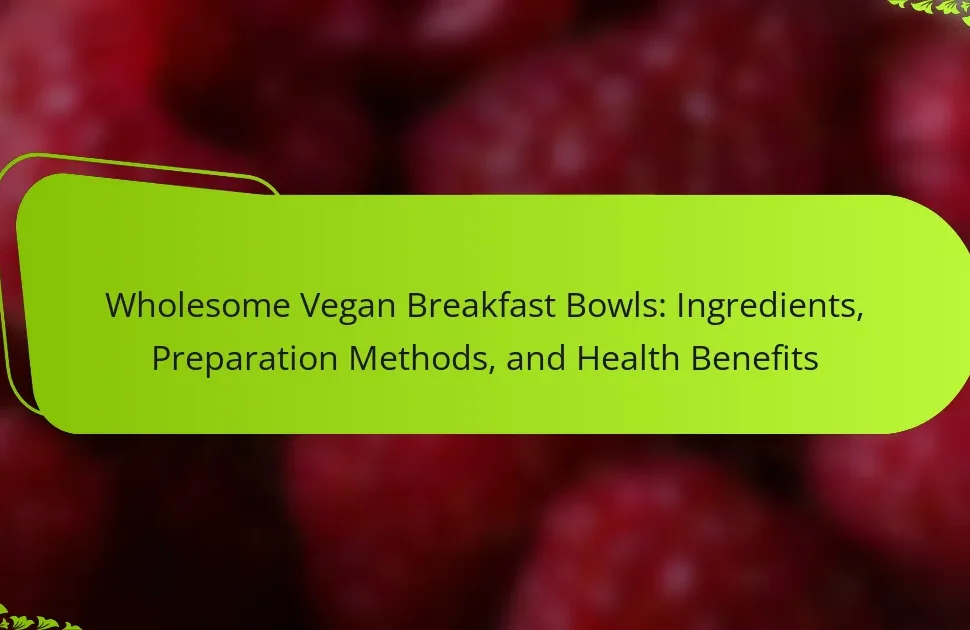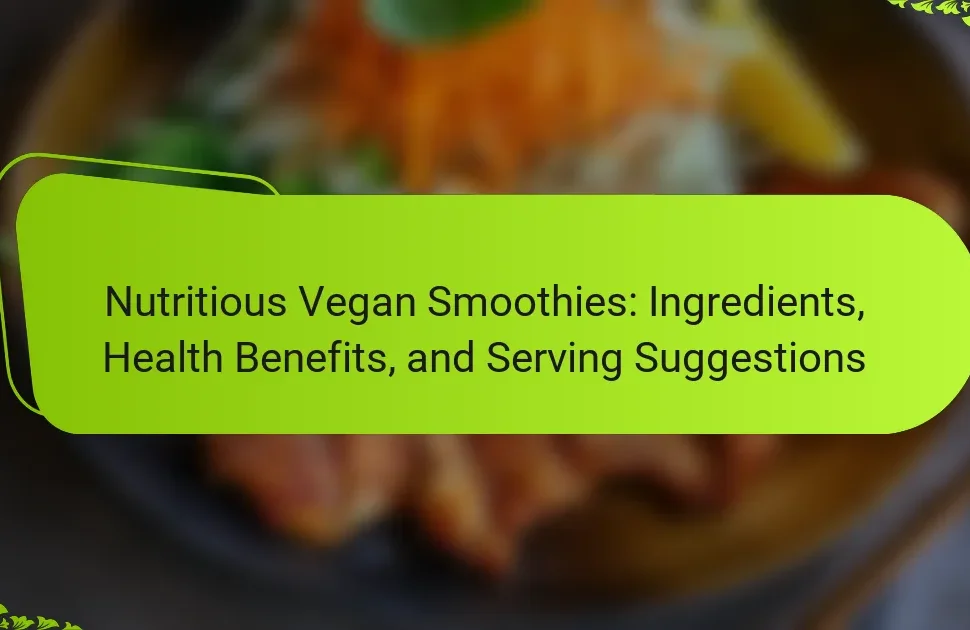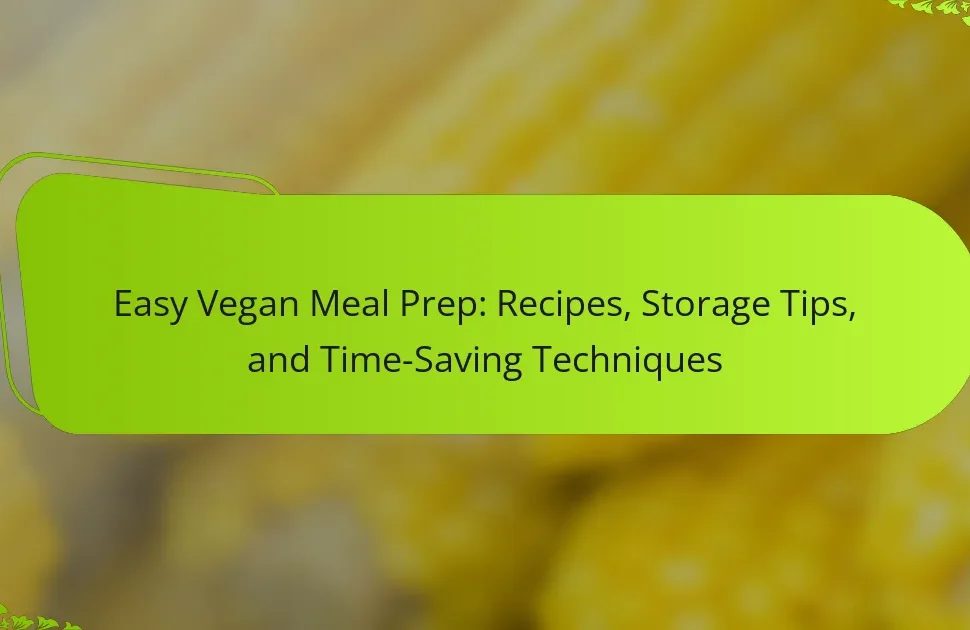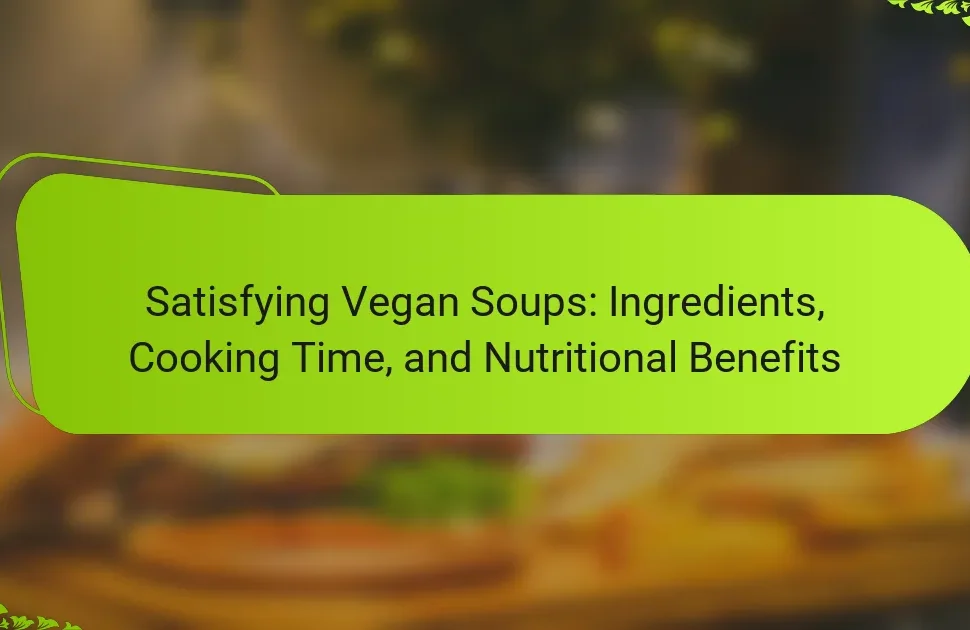
What are Delicious Vegan Desserts?
Delicious vegan desserts are plant-based sweet treats that do not contain any animal products. These desserts often use ingredients like fruits, nuts, seeds, and plant-based milks. Common examples include vegan chocolate cake, coconut milk ice cream, and fruit sorbets. They can be made with natural sweeteners such as maple syrup or agave nectar. Vegan desserts can also feature alternatives to dairy and eggs, like aquafaba and coconut cream. Studies show that vegan diets can be lower in saturated fats and cholesterol, promoting better heart health. Thus, delicious vegan desserts can be both tasty and healthier options for dessert lovers.
How are Vegan Desserts different from traditional desserts?
Vegan desserts differ from traditional desserts primarily by omitting animal products. Traditional desserts often contain ingredients like eggs, dairy, and gelatin. Vegan desserts replace these with plant-based alternatives. Common substitutes include almond milk for dairy and flaxseed meal for eggs. This makes vegan desserts suitable for those with dietary restrictions. Additionally, vegan desserts can be lower in cholesterol. They often use natural sweeteners like maple syrup or agave nectar. Nutritional profiles may vary, with some vegan desserts being higher in fiber. Overall, the main distinction lies in the ingredient composition.
What key ingredients define vegan desserts?
Vegan desserts are defined by the absence of animal-derived ingredients. Key ingredients include plant-based alternatives to dairy, eggs, and honey. Common substitutes for dairy include almond milk, coconut cream, and cashew yogurt. Instead of eggs, ingredients like flaxseed meal or applesauce are often used for binding. Sweeteners such as maple syrup or agave nectar replace honey. Additionally, whole grains, nuts, and fruits are frequently utilized for texture and flavor. These ingredients ensure that vegan desserts remain delicious while adhering to a plant-based diet.
Why are plant-based ingredients important in vegan desserts?
Plant-based ingredients are essential in vegan desserts because they replace animal-derived components. These ingredients provide flavor, texture, and nutrition without using dairy or eggs. Common plant-based ingredients include fruits, nuts, seeds, and alternative flours. They contribute to the overall health benefits of desserts, such as lower cholesterol and higher fiber content. Additionally, plant-based ingredients support sustainability by reducing the environmental impact associated with animal farming. Research shows that vegan diets can lead to a lower risk of chronic diseases. Therefore, using plant-based ingredients aligns with health-conscious and environmentally friendly eating practices.
What are the benefits of choosing Vegan Desserts?
Vegan desserts offer numerous health benefits. They are typically lower in saturated fats compared to traditional desserts. This can contribute to better heart health. Vegan desserts also often contain more fiber. Increased fiber intake supports digestive health. Many vegan desserts use natural sweeteners. These alternatives can reduce refined sugar consumption. Vegan desserts are often rich in antioxidants. Ingredients like fruits and nuts provide these beneficial compounds. Additionally, they cater to various dietary restrictions. Vegan desserts are suitable for those with lactose intolerance or dairy allergies. This inclusivity makes them a popular choice. Overall, choosing vegan desserts can promote a healthier lifestyle.
How do Vegan Desserts contribute to a healthier lifestyle?
Vegan desserts contribute to a healthier lifestyle by utilizing plant-based ingredients. These ingredients are often lower in saturated fats and cholesterol. They typically contain more fiber, which aids digestion and promotes satiety. Many vegan desserts use natural sweeteners like maple syrup or agave nectar. These alternatives can have a lower glycemic index compared to refined sugars. Additionally, vegan desserts often include fruits, nuts, and whole grains, providing essential vitamins and minerals. Studies show that diets high in plant-based foods are linked to lower risks of heart disease and obesity. Therefore, incorporating vegan desserts can enhance overall health.
What environmental advantages come with Vegan Desserts?
Vegan desserts offer several environmental advantages. They typically require fewer natural resources compared to traditional desserts. Plant-based ingredients generally have a lower carbon footprint. For example, producing almond milk uses 80% less water than dairy milk. Additionally, vegan desserts reduce greenhouse gas emissions associated with livestock farming. According to a study by the University of Oxford, a vegan diet can reduce an individual’s carbon footprint by up to 70%. Furthermore, vegan desserts contribute to biodiversity preservation by decreasing the demand for animal agriculture. This shift helps protect ecosystems and promotes sustainable farming practices. Overall, choosing vegan desserts supports environmental sustainability.
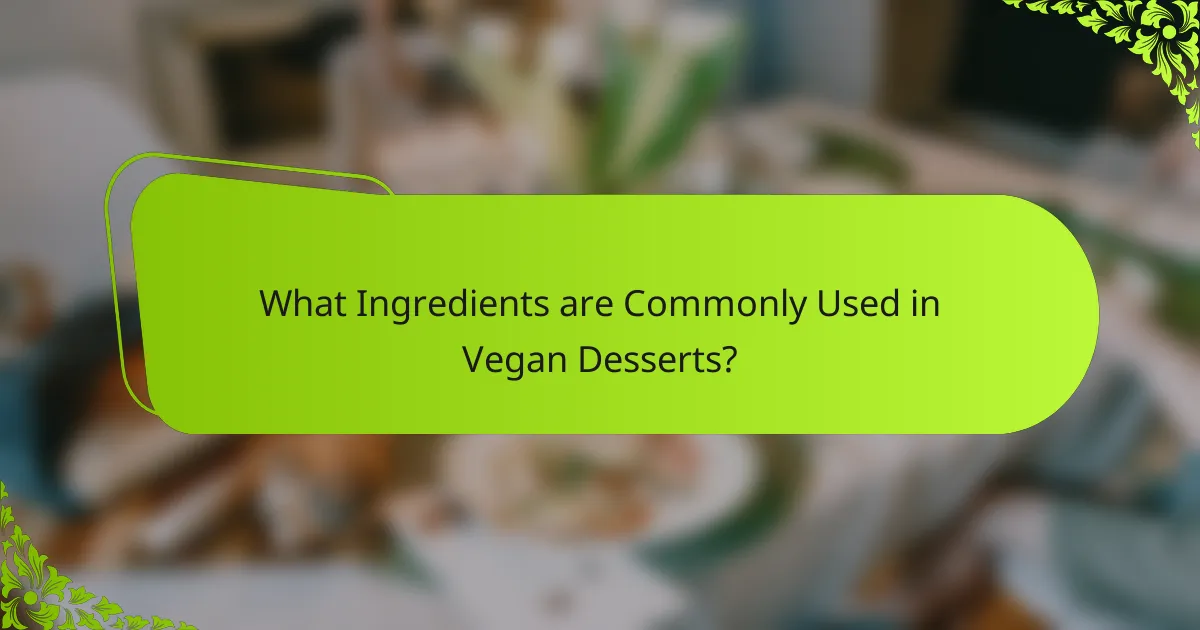
What Ingredients are Commonly Used in Vegan Desserts?
Common ingredients used in vegan desserts include plant-based alternatives to dairy and eggs. Common substitutes for dairy are almond milk, coconut milk, and cashew cream. These provide creaminess without animal products. For binding and leavening, ingredients like flaxseed meal and aquafaba are popular. Flaxseed meal is often mixed with water to create a gel-like consistency. Aquafaba, the liquid from canned chickpeas, can mimic egg whites in recipes. Sweeteners such as maple syrup and agave nectar replace traditional sugars. Cocoa powder and dark chocolate are used for flavor in chocolate desserts. Whole grains like oats and almond flour are common bases for crusts and batters. These ingredients ensure that vegan desserts are both delicious and satisfying.
Which types of sweeteners are suitable for Vegan Desserts?
Natural sweeteners are suitable for vegan desserts. Common options include maple syrup, agave nectar, and coconut sugar. These sweeteners are derived from plant sources. They do not contain any animal products. Maple syrup is made from the sap of maple trees. Agave nectar comes from the agave plant. Coconut sugar is produced from the sap of coconut palm flowers. These sweeteners provide a range of flavors and sweetness levels. They are often less processed than refined sugars. This makes them a healthier choice for many dessert recipes.
What are the best natural sweeteners for vegan baking?
The best natural sweeteners for vegan baking include maple syrup, agave nectar, and coconut sugar. Maple syrup is a popular choice due to its rich flavor and liquid form, which can enhance moisture in baked goods. Agave nectar is sweeter than sugar and has a low glycemic index, making it a healthier alternative. Coconut sugar retains some nutrients and has a lower glycemic index compared to regular sugar. Other options include date syrup and brown rice syrup, both of which provide unique flavors and textures. These sweeteners are commonly used in vegan recipes to replace refined sugars while maintaining taste and health benefits.
How do sweeteners affect the taste and texture of Vegan Desserts?
Sweeteners significantly influence the taste and texture of vegan desserts. Natural sweeteners like maple syrup and agave nectar add distinct flavors and moisture. They enhance sweetness without overpowering other ingredients. Artificial sweeteners provide a different sweetness profile, often lacking in mouthfeel. This can result in a drier texture in baked goods. Sugar alternatives like coconut sugar impart a caramel-like flavor, enriching the overall taste. The choice of sweetener can also affect browning during baking. For instance, honey substitutes may not caramelize as well as traditional sugars. Therefore, selecting the right sweetener is crucial for achieving desired taste and texture in vegan desserts.
What alternative dairy products can be used in Vegan Desserts?
Coconut milk, almond milk, and cashew cream are popular alternative dairy products used in vegan desserts. Coconut milk provides a rich, creamy texture and is high in healthy fats. Almond milk is lighter and has a subtle nutty flavor, making it versatile for various recipes. Cashew cream, made by blending soaked cashews with water, offers a smooth and creamy consistency, ideal for frostings and sauces. These alternatives can replace traditional dairy in recipes, ensuring that vegan desserts remain delicious and satisfying.
How do nut milks compare to traditional dairy in desserts?
Nut milks offer a dairy-free alternative to traditional dairy in desserts. They provide a different flavor profile and texture. Common nut milks include almond, cashew, and hazelnut. These milks are typically lower in calories and saturated fat compared to whole dairy milk. Nut milks also lack lactose, making them suitable for lactose-intolerant individuals.
In terms of sweetness, many nut milks are naturally sweeter than dairy milk. This can enhance the flavor of desserts without added sugars. However, nut milks may not whip or froth like dairy, affecting recipes like whipped cream.
The nutritional content varies; for instance, almond milk contains about 30 calories per cup, while whole milk has around 150 calories. Research indicates that nut milks can be fortified with vitamins and minerals, such as calcium and vitamin D, to match dairy’s nutritional benefits.
Overall, nut milks can be a versatile and healthier option for creating vegan desserts.
What are the benefits of using coconut cream in vegan recipes?
Coconut cream provides rich flavor and creamy texture in vegan recipes. It enhances the taste of desserts, making them more indulgent. Coconut cream is high in healthy fats, particularly medium-chain triglycerides (MCTs), which can support energy levels. It is also dairy-free, making it suitable for those with lactose intolerance or dairy allergies. Additionally, coconut cream contains vitamins C and E, contributing to skin health. Its natural sweetness can reduce the need for added sugars in recipes. Coconut cream is versatile and can be used in various dishes, from smoothies to cakes. These benefits make it a popular choice in vegan cooking.
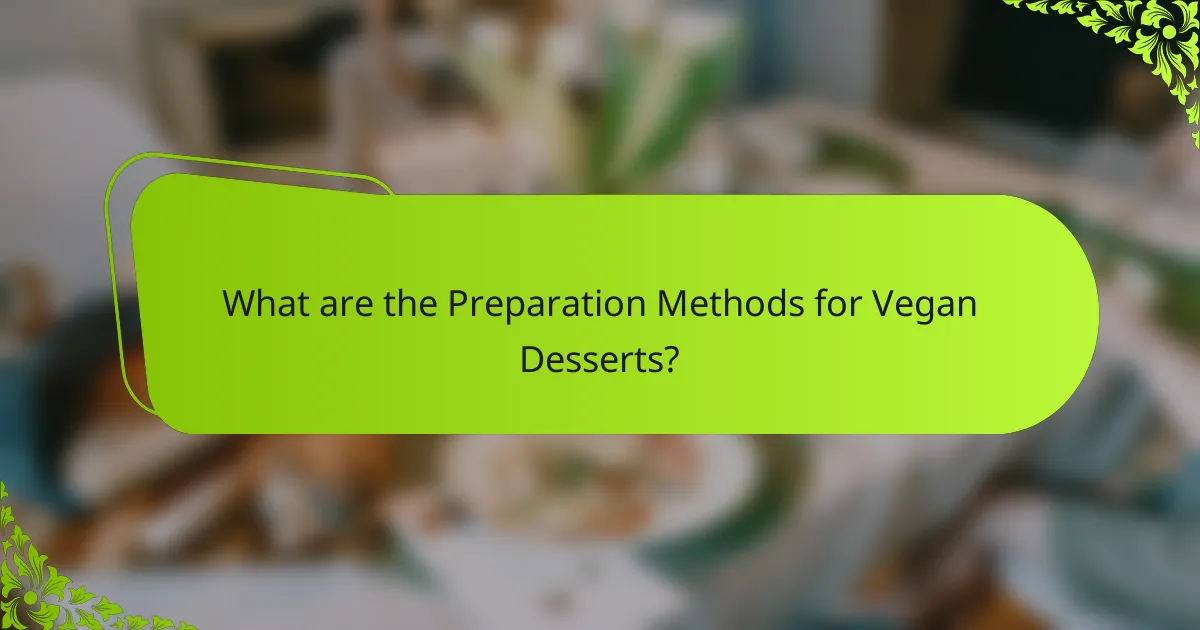
What are the Preparation Methods for Vegan Desserts?
Vegan desserts can be prepared using various methods. Common methods include baking, no-bake preparation, freezing, and blending. Baking involves mixing ingredients and cooking them in an oven. No-bake preparation requires combining ingredients without heat, often using refrigeration to set the dessert. Freezing is used for items like sorbets and ice creams, where ingredients are churned and then frozen. Blending is often used for smoothies and puddings, creating a smooth texture by mixing ingredients in a blender. Each method allows for diverse textures and flavors in vegan desserts.
How can you effectively substitute eggs in vegan baking?
To effectively substitute eggs in vegan baking, use alternatives like flaxseed meal, chia seeds, or applesauce. Flaxseed meal can replace one egg with one tablespoon of ground flaxseed mixed with three tablespoons of water. Chia seeds work similarly; one tablespoon of chia seeds mixed with three tablespoons of water can replace one egg. Applesauce is another option; one-quarter cup of unsweetened applesauce can substitute for one egg. These substitutes provide binding and moisture, essential for baked goods. Studies show these alternatives maintain texture and flavor in vegan recipes.
What are the best egg replacements for different types of desserts?
Applesauce, mashed bananas, and flaxseed meal are among the best egg replacements for desserts. Applesauce works well in cakes and muffins, providing moisture and binding. Mashed bananas add sweetness and density, ideal for brownies and pancakes. Flaxseed meal, when mixed with water, creates a gel-like substance that mimics eggs, suitable for cookies and quick breads. Silken tofu can also replace eggs in custards and puddings, offering creaminess. Each substitute varies in flavor and texture, making them versatile for different dessert types.
How do these substitutes impact the final product?
Substitutes impact the final product by altering texture, flavor, and nutritional profile. For instance, using applesauce instead of eggs can create a moister texture in baked goods. Additionally, coconut oil can replace butter, providing a distinct flavor and a dairy-free option. Plant-based milk can change the creaminess of desserts, affecting overall mouthfeel. These changes can also enhance the health benefits by reducing saturated fats and cholesterol. Research shows that using alternatives like almond flour instead of regular flour increases protein content. Therefore, the choice of substitutes directly influences the sensory and health attributes of vegan desserts.
What baking techniques are unique to Vegan Desserts?
Vegan desserts utilize unique baking techniques that replace traditional ingredients with plant-based alternatives. One technique is aquafaba, the liquid from canned chickpeas, which can mimic egg whites in recipes. It can be whipped to create meringues or added to batters for leavening. Another method involves using flaxseed or chia seeds mixed with water as an egg substitute. This creates a binding effect in baked goods.
Additionally, vegan desserts often incorporate nut butters or coconut oil for moisture and richness, replacing butter. Another unique technique is using ripe bananas or applesauce for natural sweetness and moisture, reducing the need for added sugars. These techniques allow for the creation of delicious desserts without animal products while maintaining texture and flavor.
How does temperature control affect vegan baking?
Temperature control significantly affects vegan baking by influencing texture and rise. Vegan recipes often rely on specific temperatures for optimal ingredient activation. For instance, baking soda needs heat to create carbon dioxide, which helps baked goods rise. If the temperature is too low, the rise may not occur, leading to dense textures. Conversely, excessive heat can cause over-browning or burning before the interior cooks properly.
Moreover, temperature impacts the melting point of vegan fats, such as coconut oil or vegan butter. These fats need to be at the correct temperature for proper incorporation into batters. Studies have shown that maintaining the right baking temperature results in better moisture retention and flavor development. Therefore, precise temperature control is crucial for achieving the desired outcomes in vegan baking.
What is the significance of ingredient mixing methods in vegan recipes?
Ingredient mixing methods in vegan recipes are crucial for achieving desired textures and flavors. Proper mixing ensures that ingredients are evenly distributed, which affects the final product’s consistency. For instance, techniques like folding or whipping can incorporate air, resulting in lighter baked goods. Additionally, the method can influence the hydration of dry ingredients, impacting moisture levels. Research shows that different mixing techniques can alter the gluten development in flour, even in gluten-free recipes. This highlights the importance of method selection for optimal results in vegan baking.
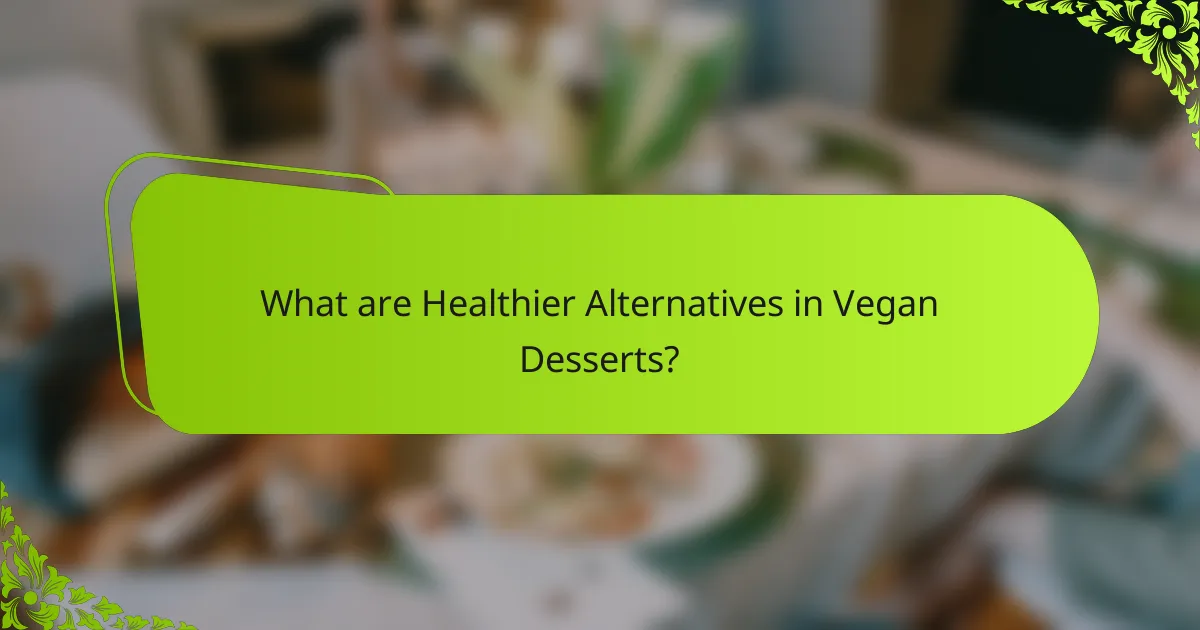
What are Healthier Alternatives in Vegan Desserts?
Healthier alternatives in vegan desserts include using natural sweeteners, whole grains, and plant-based fats. Natural sweeteners like maple syrup or agave nectar replace refined sugar. Whole grains such as oat flour or almond flour can substitute white flour. Plant-based fats like avocado or coconut oil serve as healthier replacements for butter. These alternatives contribute to better nutritional profiles. For instance, using almond flour increases protein content while lowering carbohydrates. Additionally, incorporating fruits like bananas or applesauce can enhance moisture and sweetness without added sugars.
How can you reduce sugar in Vegan Desserts without sacrificing taste?
To reduce sugar in vegan desserts without sacrificing taste, use natural sweeteners like maple syrup or agave nectar. These alternatives provide sweetness with lower glycemic indices. Incorporating ripe fruits, such as bananas or dates, adds natural sugars and enhances flavor. Additionally, using spices like cinnamon or vanilla can create a perception of sweetness without adding sugar. Experimenting with unsweetened cocoa powder can also enrich desserts while minimizing sugar content. Studies show that substituting refined sugars with these options maintains overall taste satisfaction.
What natural sugar substitutes can enhance flavor?
Natural sugar substitutes that can enhance flavor include stevia, maple syrup, agave nectar, and coconut sugar. Stevia is derived from the leaves of the Stevia rebaudiana plant. It is known for its intense sweetness without calories. Maple syrup offers a rich, caramel-like flavor and contains antioxidants. Agave nectar is sweeter than honey and has a mild taste, making it versatile. Coconut sugar has a lower glycemic index and a hint of caramel flavor. These substitutes not only provide sweetness but also contribute unique flavors to vegan desserts.
How does reducing sugar impact the health benefits of Vegan Desserts?
Reducing sugar enhances the health benefits of vegan desserts. Lower sugar content decreases calorie intake, which can aid in weight management. It also helps stabilize blood sugar levels, reducing the risk of diabetes. Moreover, less sugar can improve heart health by lowering blood pressure and triglyceride levels. Research shows that high sugar consumption is linked to increased inflammation, while reducing sugar can alleviate this issue. Additionally, using natural sweeteners can increase nutrient density without the adverse effects of refined sugar. Overall, reducing sugar in vegan desserts contributes to better health outcomes.
What are some tips for creating healthier Vegan Desserts?
Use natural sweeteners instead of refined sugars for healthier vegan desserts. Options like maple syrup, agave nectar, or ripe bananas can provide sweetness with added nutrients. Incorporate whole grains like oats or almond flour to boost fiber content. This can enhance the nutritional profile and improve digestion. Include fruits and vegetables to add moisture and flavor. Ingredients like applesauce or pureed pumpkin can reduce the need for added fats. Opt for nut butters instead of margarine to provide healthy fats. This can improve the overall health benefits of the dessert. Experiment with spices like cinnamon or vanilla for flavor without extra calories. These alternatives can make desserts more satisfying without compromising health.
How can portion control improve the healthiness of Vegan Desserts?
Portion control can significantly improve the healthiness of vegan desserts by regulating calorie intake. By consuming smaller servings, individuals can enjoy the flavors without excessive sugar or fat. This practice can help prevent overeating, which is linked to weight gain and related health issues. Studies show that portion sizes have increased over the years, contributing to higher caloric consumption. For instance, a study published in the American Journal of Clinical Nutrition found that larger portions lead to increased energy intake. Therefore, controlling portions allows for a balanced approach to enjoying vegan desserts while maintaining overall health.
What are some common mistakes to avoid when making Vegan Desserts?
Common mistakes to avoid when making vegan desserts include using insufficient binding agents. Vegan recipes often require alternatives like flaxseed or chia seeds for structure. Another mistake is not balancing flavors properly. Vegan desserts can taste bland without the right combination of sweeteners and spices.
Overmixing the batter is also a frequent error. This can lead to dense textures instead of the desired lightness. Additionally, neglecting to measure ingredients accurately can ruin the final product. Precision is key in baking, especially when substituting ingredients.
Lastly, underestimating the importance of chilling time can affect the texture. Many vegan desserts benefit from proper refrigeration to set correctly. Avoiding these mistakes can lead to more successful and enjoyable vegan desserts.
Delicious vegan desserts are plant-based sweet treats made without animal products, utilizing ingredients such as fruits, nuts, seeds, and plant-based milks. This article explores the differences between vegan and traditional desserts, highlighting key ingredients, preparation methods, and the health benefits associated with vegan options. It also discusses the significance of natural sweeteners, alternative dairy products, and healthier alternatives to refined sugars, while providing tips for successful vegan baking. Additionally, the article addresses common mistakes to avoid, ensuring readers can create satisfying and nutritious vegan desserts.
